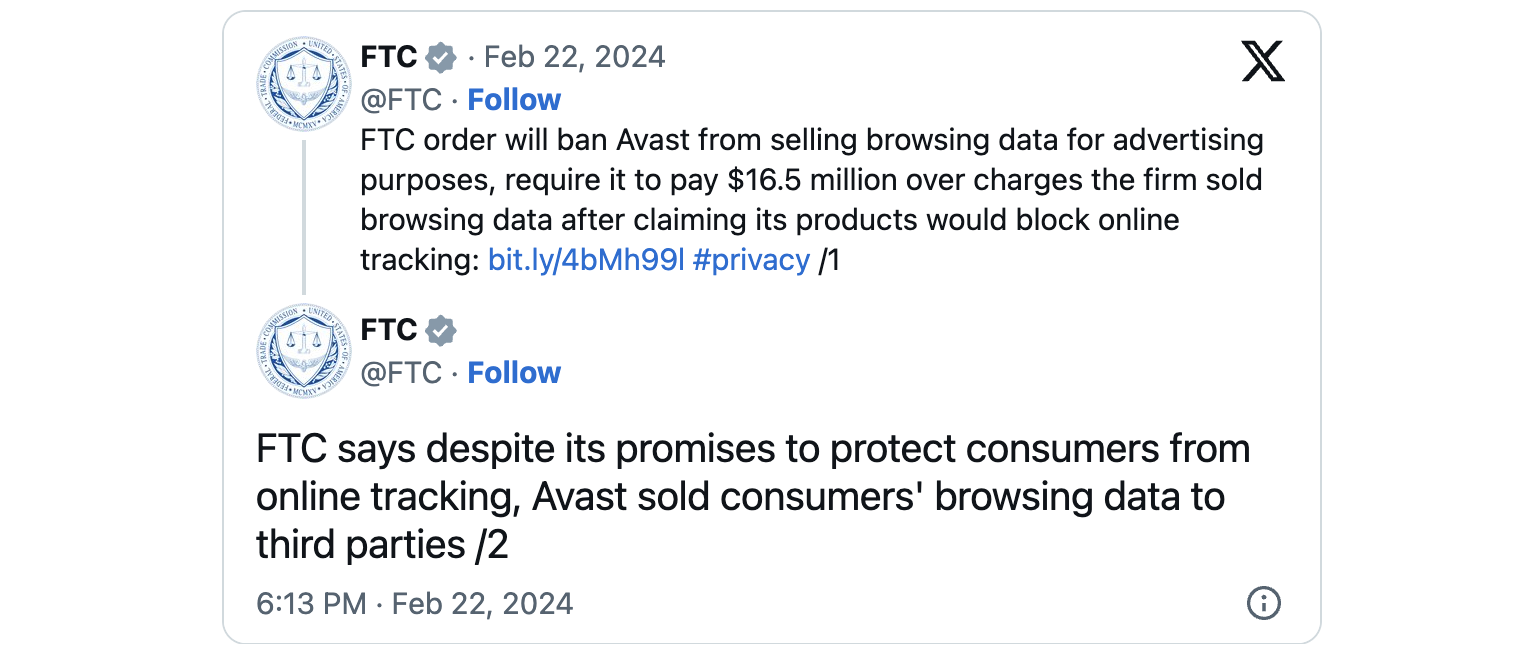
The U.S. Federal Commerce Fee (FTC) will order Avast to pay $16.5 million and ban the corporate from promoting the customers’ internet shopping information or licensing it for promoting functions.
The complaint says Avast violated hundreds of thousands of shoppers’ rights by gathering, storing, and promoting their shopping information with out their data and consent whereas deceptive them that the merchandise used to reap their information would block on-line monitoring.
“Whereas the FTC’s privateness lawsuits routinely tackle companies that misrepresent their information practices, Avast’s resolution to expressly market its merchandise as safeguarding individuals’s shopping data and defending information from monitoring solely to then promote these data is particularly galling,” said FTC Chair Lina M. Khan.
“Furthermore, the amount of information Avast launched is staggering: the criticism alleges that by 2020 Jumpshot had amassed “greater than eight petabytes of shopping data relationship again to 2014.”
Extra particularly, the FTC says UK-based firm Avast Restricted harvested shoppers’ internet shopping data with out their data or consent utilizing Avast browser extensions and antivirus software program since not less than 2014.
Avast information feeds included distinctive identifiers for every internet browser and a mixture of information on each web site visited, timestamps, kind of system and browser, in addition to the customers’ metropolis, state, and nation. When describing its data-sharing practices, the corporate additionally falsely claimed it will solely switch the customers’ private data in an mixture and nameless type.
The FTC additionally stated Avast saved this data indefinitely and offered it to over 100 third events between 2014 and 2020 by means of their Jumpshot subsidiary.
As an example, Jumpshot made an settlement with promoting firm Omnicom, which allowed it to entry 50% of Jumpshot’s buyer information from six international locations: the USA, the UK, Mexico, Australia, Canada, and Germany, as alleged within the criticism.
Avast additionally purportedly misled customers by promising to guard their privateness by blocking third-party monitoring. Nonetheless, it failed to tell them that their detailed, re-identifiable shopping information can be offered.
The corporate’s information harvesting practices have been uncovered in December 2019 after Mozilla pulled four of the company’s browser extensions (i.e., Avast Online Security, Avast SafePrice, AVG Online Security, and AVG SafePrice) from its Firefox addon repository after receiving experiences that they have been monitoring customers’ internet shopping.
A Motherboard / PCMag joint investigation discovered one month later that Avast’s Jumpshot subsidiary was promoting the shopping information collected from clients to third events, together with the Omnicom information dealer named in FTC’s criticism.
In addition to being ordered to pay $16.5 million, Avast can be prohibited from licensing or promoting any shopping information collected utilizing Avast-branded merchandise to 3rd events for promoting functions.
The corporate should receive consent from all clients earlier than promoting or licensing shopping information obtained from non-Avast merchandise. The FTC can even require Avast to delete all internet shopping information shared with Jumpshot and any merchandise or algorithms developed by Jumpshot utilizing stated information.
Moreover, Avast should notify customers whose shopping information was offered to 3rd events with out their consent in regards to the FTC’s actions towards the corporate.
“Avast promised customers that its merchandise would shield the privateness of their shopping information however delivered the other. Avast’s bait-and-switch surveillance techniques compromised shoppers’ privateness and broke the legislation,” stated Samuel Levine, the pinnacle of the FTC’s Bureau of Shopper Safety.
An Avast spokesperson advised BleepingComputer that the corporate has already reached a settlement with the FTC to resolve the investigation relating to the info shared with the Jumpshot subsidiary that was shut down in January 2020.
“We’re dedicated to our mission of defending and empowering individuals’s digital lives,” the spokesperson stated.
“Whereas we disagree with the FTC’s allegation and characterization of the details, we’re happy to resolve this matter and stay up for persevering with to serve our hundreds of thousands of consumers around the globe.”
Replace February 22, 11:57 EST: Added Avast’s assertion.








